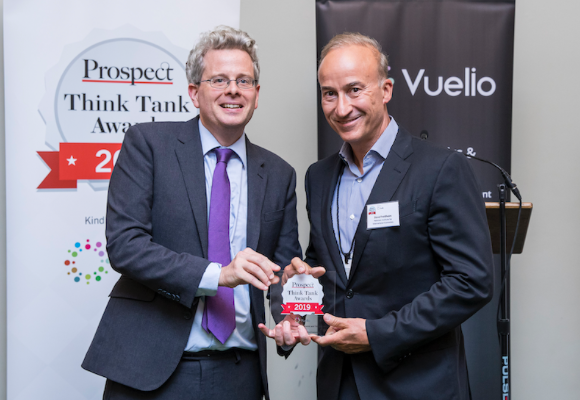The 21st century is riven with daunting challenges. The uncertainty over Brexit and the wildly unpredictable man in the White House loom large for the moment. But in the background are issues that we’ll be grappling with for far longer: the rise of China; a fast-aging society; robots transforming the world of work. In the face of all this, public policy has to evolve, which makes think tanks more important than ever. On 17th July
Prospect held its annual awards in the heart of parliament, to honour the work they do. Many of them are grappling with deep tides of technology, demography and inequality as well as the frail condition of liberal democracy. Even more are working on climate change. It is a problem we’ve known about for decades, but one which striking schoolchildren have put firmly at the top of the agenda. This challenge knows no national boundaries, and indeed
Prospect took submissions from around the world, from think tanks of every variety. They were judged by leading scholars, journalists, lawyers and politicians from across the spectrum, including former foreign secretaries David Miliband and Malcolm Rifkind. Where the competition for first place was extremely close we applied tie-break criteria, giving an edge to those doing the most to train the next generation of researchers and demonstrating exemplary transparency in funding.
US and the rest of the world Beginning with US entries in the Science, Health, Environment and Energy category, we had two runners-up: Climate Interactive, which judges noted had devised a modelling tool which “other leading organisations are [now] using… to visualise the impact of climate change.” Equally impressive was RAND, which helped frame the debate on American healthcare and grabbed the attention of Bernie Sanders. There could only be one winner, however, and this year it was Canada’s International Institute for Sustainable Development (IISD). The institute’s unique work examined the potential for future conflict over the minerals needed to produce green energy. Originality set them apart. In Economic and Financial Affairs, the climate crisis again featured. Resources for the Future published, in the words of one judge, “serious analysis that produces (appropriately enough) light, rather than heat.” The runner-up was the International Institute for Sustainable Development, for its investigation of Canada’s growth model. But the Peterson Institute for International Economics stole the show. This repeat winner offered “powerful analysis,” especially of the costs of the US-China trade war.















